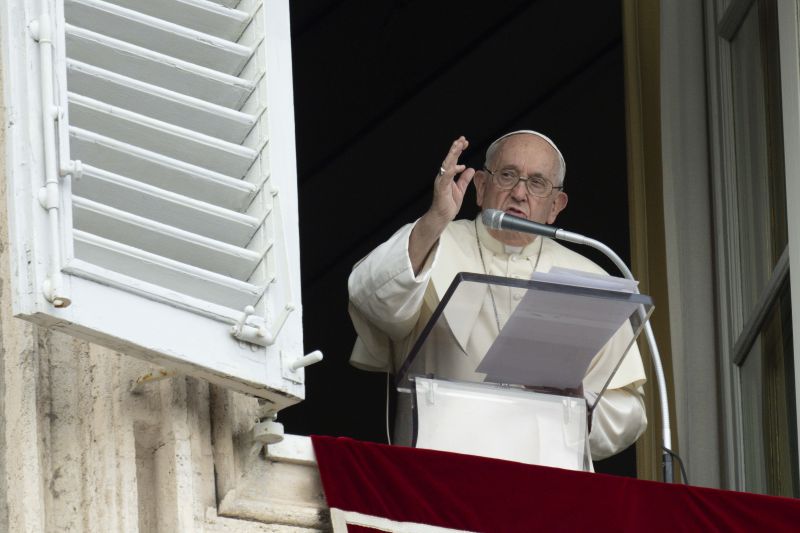
Vatican City, Jul 2, 2023 / 05:30 am (CNA).
Every baptized person is called to be a modern-day prophet, living as a witness of Jesus to others, Pope Francis said on Sunday.
In his Angelus address July 2, the pope recalled that at our baptism, each of us received “the gift of the prophetic mission.”
The pope, addressing an estimated 15,000 pilgrims and tourists gathered in St. Peter’s Square, said a prophet is not a kind of magician who can tell the future.
“This is a superstitious idea and a Christian does not believe in superstitions, such as magic, tarot cards, horoscopes and other similar things,” he said, lamenting that “many, many Christians go to have their palms read.”
“A prophet is a living sign who points God out to others, a prophet is a reflection of Christ’s light on the path of his brothers and sisters,” he explained, inviting everyone to ask themselves: “Do I live as a witness of Jesus?”
“Do I bring a little bit of his light into the life of another person? Do I evaluate myself on this? I ask myself: What is my bearing witness like, what is my prophecy like?” he said.
Pope Francis gave his weekly Sunday address, and recited the Marian prayer the Angelus, from a window of the Apostolic Palace.
He said not only are each of the baptized called to be prophetic witnesses of Christ, they also should welcome other Christians in their identity as prophets.
“It is important to welcome each other as such, as bearers of God’s message, each one according to his state and vocation, and to do it right where we live — that is, in the family, in the parish, in the religious community, in other places in the Church and in society,” he said.
“The Spirit,” he added, “has distributed gifts of prophecy in the holy People of God. This is why it is good to listen to everyone.”
His advice for making an important decision is to pray about it first of all and to call on the Holy Spirit.
“But then listen and dialogue trusting that each person, even the littlest, has something important to say, a prophetic gift to share,” Francis said. “Thus, the truth is sought and the climate of listening to God and our brothers and sisters is spread…”
People should feel accepted and valued because they are gifts, he said, not only because they say what we like to hear.
Pope Francis said we could avoid or resolve a lot of conflicts by listening to others with the desire to understand.
“So, finally, let us ask ourselves: Do I know how to welcome my brothers and sisters as prophetic gifts?” he said. “Do I believe that I need them? Do I listen to them respectfully, with the desire to learn? Because each of us needs to learn from others.”
After praying the Angelus, Pope Francis recalled the importance of continuing to pray for peace around the world.
“Even in this summer time, let us not tire of praying for peace, in a special way for the Ukrainian people, [who are] so worn out.”
“And let us not neglect the other wars, unfortunately often forgotten,” he added, “and the numerous conflicts and clashes that bloody many places on earth.”
“Let us take an interest in what is happening, let us help those who are suffering, and let us pray, for prayer is the gentle force that protects and sustains the world,” he concluded.
If you value the news and views Catholic World Report provides, please consider donating to support our efforts. Your contribution will help us continue to make CWR available to all readers worldwide for free, without a subscription. Thank you for your generosity!
Click here for more information on donating to CWR. Click here to sign up for our newsletter.




We read: ““Do I bring a little bit of his light into the life of another person?”
Very good counsel from our Pope, a reminder of another who remarked that such moments of light in time are the “seeds of eternity.” And a reminder of a writing by the early 18th-century Jean-Pierre de Caussade: “Abandonment to Divine Providence,” where we hear about “the sacrament of the present moment,” and who greatly influenced the late 19th-century St. Therese of Lisieux and her “little way” of “doing ordinary things with extraordinary love.”
Wondering, here, what these small voices—“even the littlest”—would say to us today about the noisy 21st-century German schism and, in addition, what they would say about a listening, complexly inverted, active, and seemingly voiceless “synod” (what’s that?) on Synodality?
Not much mention there about the interior life…
Blessed with fearless minds and confidence in their wrists, prophets try to show the way forward. Prophets John the Baptist, Isaiah, Jeremiah, Hosea, Amos, and their colleagues – Pray for us.
A question that the pope himself must ask and not run away from an answer he constantly obfuscates in preferring to be true to his “wanting to mess things up”.
At some point, with the various ‘Synods’ especially the German variant, this Pope will have to come out of his “theological hiding” and declare for the Church or for the world.
We’re waiting, Pope Francis…